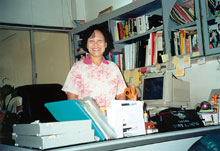Mother, son reunited after separation

Ann Tran became separated from her two sons during the war but was reunited with them later in life.
It is said some of the most incredible stories happen during, or as a result of, war. This axiom definitely fits when speaking of Ann Tran and her family members.
Their tale is one of overcoming major odds just to be together. To simply say they have made the most of life is a major understatement. I only hope this condensed account does some justice to their story. This certainly is not the first time it has been told. The family has been featured on “CBS Sunday Morn-ing,” as well as a recent PBS Documentary titled “Vietnam Pass-age: Journeys from War to Peace.”
Ann Tran went to work for the U.S. Agency for International Development in Saigon in 1966 after high school. She married a South Vietnamese Army officer shortly after. Their eldest child, Tony, was born on an American “Huey” helicopter on the way to the hospital. Life was good. Eight years later, Ann was a widow with three children to raise in wartime.
As the communists pushed their way toward Saigon in the spring of 1975, Ann was able to secure plane tickets out of Vietnam for her three children and herself because of her job with the U.S. Embassy. The day she took her children to Tan Son Nhut Airport, it appeared others not employed by the Americans were also able to get out, so she made the fateful decision to return home with her daughter to try and have her parents evacuated as well. Her sons, Tony and Tim, were sent ahead on a plane; she would catch up with them the next day.
But by the time Ann reached the embassy, it was too late — the crowds were no longer manageable. Shortly thereafter, an NVA tank crashed the gate at the Presidential Palace and the war was over. Ann had become separated from her two sons, but that was not the only price she paid. For 18 months, she would live in a “re-education camp” as a result of her having been employed by the enemy.
During the 1980s, Ann supported her family by selling ice on the streets of Saigon, using the refrigerator she had purchased at the American PX during the war. The economy had been crushed by the war, government collectivization programs, and the United States led trade embargo on Vietnam. By the late ’80s, Vietnam began market reforms, and Ann was able to open a travel agency with the far-flung yet specific hope of locating her sons with the help of tourists.
In 1991 that is exactly what happened. A Vietnamese-American business person who had booked a trip with her company returned to San Jose, Calif., and found Tony and Tim in the phone book.
Tony recounts the story: “It was four o’clock in the morning…and I got a phone call. The voice at the other end said, ‘This is your mother speaking. Do you miss me? Do you remember me?’
“And she cried, and I would never forget that day.”
In 1992, the brothers reunited with their mother and sister, and in 1993, they moved to Ho Chi Minh City to help with the travel business. Tim returned to California four years later to continue his education. Since then, Tony has had to relearn his native language and culture. He tells me he wouldn’t change a thing. He and his brother have started an import/export business, U.S. Trade Assistance, with Tony based in Ho Chi Minh City and Tim in Huntington Beach, Calif. — a pretty good scenario now that the U.S.-Vietnam Bilateral Trade Agreement is in effect, current shipyard slowdown in California notwithstanding. Successful in business, the family has been able to do its part in the continued rebuilding of Vietnam. Ann is active in the community, and Tony works with cooperatives in and around the city to help them find their way into the U.S. market.
To learn more about their story and about Vietnam, see www.pbs. org/vietnampassage/Stories/in-dex.html.
Your donation will support the student journalists of Missouri Southern State University. Your contribution will allow us to purchase equipment and cover our annual website hosting costs.



























